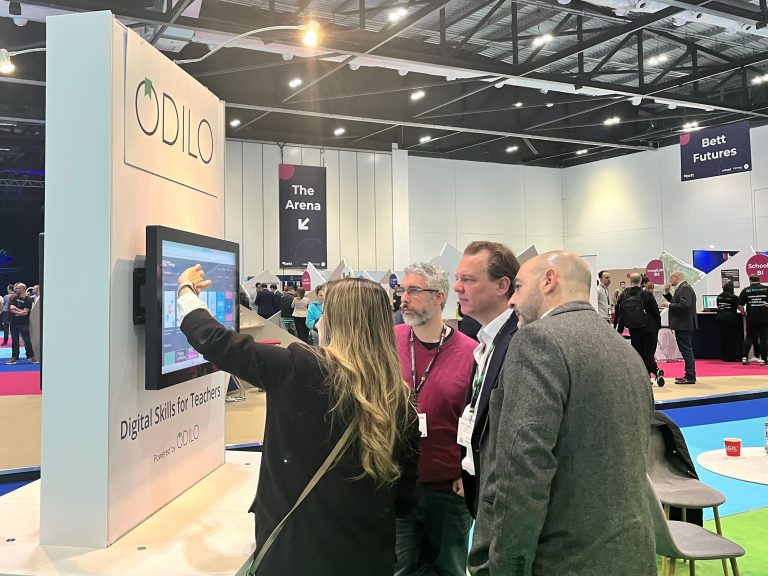Categories:
- Low user engagement in learning, as well as failure to meet the educational expectations of institutions, are some of the main challenges faced by schools and colleges in addressing the digitization of education.
- The lack of visibility that institutions have regarding learning outcomes makes it essential for them to have metrics and data that allow them to evaluate and understand how each student is performing.
Madrid, March 31, 2023 – Last year, José Manuel Bar, Secretary of State for Education, announced the creation of the Digitalization and Digital Skills Plan for the Education System, a project with a budget of 1.2 billion euros over the coming years that seeks to “guarantee and improve quality public digital learning for all”. This objective will be fundamentally aided by the latest advances and innovations that the EdTech industry can bring to the country.
In order for the education system to accelerate its digital transformation, ODILO, the Spanish EdTech that has created a new category in the education market by allowing any organization to create its own Unlimited Learning Ecosystem, participated in BETT, the great world congress of educational technology held in London. At this event ODILO gave a series of talks identifying, among other topics, the challenges facing learning and how these barriers can be broken down through digital education:
- Limited access to educational resources: it is of paramount importance that schools provide their students with tools that go beyond the classroom to promote lifelong learning; people learn throughout their lives and are not limited to the knowledge acquired in the classroom. This challenge demonstrates the need for these resources to be adapted to preferences and individual desires and to facilitate the creation of good learning habits.
- Multiple content platforms: many institutions have allocated a good part of their budget to multiple providers and platforms for educational content. However, for many the results achieved do not meet minimum expectations. This is due to the problem of the hyper fragmentation of an educational solutions market that is also highly disconnected. This unfortunate reality forces most centers to offer learning content limited to a few formats from specific educational providers, covering only a small part of the users’ learning needs and interests.
- Standardized plans and services: A third challenge is to put an end to the standardization of resources, as well as the belief that the same learning plan can serve all students and schools equally. Each school and teacher has their own pedagogical approach, while each student has individual learning interests. Therefore, it is necessary that the technological tools used in education are adapted to the user to provide them with a personalized experience based on their learning level and personal needs, as well as the academic plans of their school and teachers.
- Little or no visibility into learning outcomes: Ultimately, another challenge that remains to be addressed is making usage metrics available to institutions to assist them in assessing student learning outcomes. Despite the significant investment that institutions have made in learning platforms, they currently lack access to data that would allow them to understand how and what each student learns and to track student progress.
Unlimited Learning Ecosystems are the solution
To meet these challenges, ODILO designed and marketed Unlimited Learning Ecosystems that allow any organization to create ecosystems tailored to its needs and users, providing access to a total of 4 million multi-format resources from more than 6,300 providers.
These Ecosystems adapt to users, allowing them to consume content from any device, in any format, and without restrictions. In addition, institutions can develop and customize all kinds of learning experiences and programs, and ensure the best educational content among millions of options in a click away, able to suit the preferences and needs of each user. These ecosystems are the only available option that give educators the ability to combine all types of materials and to use licensed content directly in learning pathways, complying with all security guarantees, and generating fully integrated learning processes.
In addition, through the use of Artificial Intelligence, ODILO facilitates the creation of unique learning paths and experiences for both organizations and users, as well as its unique Business Intelligence system that is capable of measuring all possible forms of learning.
The advisory service provided by Unlimited Learning Coaches is also highly valued, as they provide professional services and guidance in the creation of learning plans and experiences, covering the entire strategy from setting objectives to measuring and optimizing the use of the ecosystems, in addition to carrying out actions to boost the dynamization and growth of the platform, including marketing and communication actions to enhance the use and results of the users.
Each of ODILO’s 8,500 customers has a unique platform that has been specifically designed according to their requirements.
ABOUT ODILO
ODILO is a B2B2C company which has created a new category in the education market: Unlimited Learning Ecosystems. The firm allows any organization to create its own fully customized learning ecosystems, and offer its users unlimited access to the world’s largest catalog of educational content and create all kinds of learning experiences without restrictions. In addition, through the use of Artificial Intelligence, ODILO enables the creation of unique learning paths and experiences for both organizations and users.
More than 8,500 organizations in 52 countries – including governments in Europe, North America, Latin America, Southeast Asia, Australia and Africa; academic leaders such as Peking University and top companies such as Vodafone, Nestlé and Banco Santander – have already created Unlimited Learning Ecosystems from the more than 4 million pieces of content available on the platform. In total, ODILO is part of the learning experiences of more than 170 million users worldwide.
